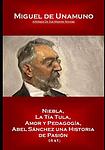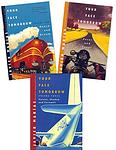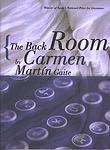The Greatest Russian, German, Spanish "Psychological, Fiction" Books Since 1900
Click to learn how this list is calculated.
This list represents a comprehensive and trusted collection of the greatest books. Developed through a specialized algorithm, it brings together 305 'best of' book lists to form a definitive guide to the world's most acclaimed books. For those interested in how these books are chosen, additional details can be found on the rankings page.
Genres
The Psychological genre of books typically explores the inner workings of the human mind and emotions, often delving into complex and sometimes disturbing psychological states. These books may focus on mental illness, trauma, relationships, or personal growth, and often challenge readers to confront their own beliefs and perceptions. Psychological books may be suspenseful, thought-provoking, and emotionally intense, offering readers a deep and often unsettling glimpse into the human psyche.
Countries
Date Range
Reading Statistics
Click the button below to see how many of these books you've read!
Download
If you're interested in downloading this list as a CSV file for use in a spreadsheet application, you can easily do so by clicking the button below. Please note that to ensure a manageable file size and faster download, the CSV will include details for only the first 500 books.
Download-
1. The Magic Mountain by Thomas Mann
In this novel, the protagonist, a young, ordinary man, visits his cousin at a tuberculosis sanatorium in the Swiss Alps. Intending to stay for only a few weeks, he ends up remaining there for seven years, becoming a patient himself. The book explores his experiences and relationships with other patients and staff, delving into philosophical discussions on life, time, and the nature of disease. It also provides a vivid portrayal of the European society and intellectual life on the eve of World War I.
The 43rd Greatest Book of All Time -
2. Steppenwolf by Hermann Hesse
The novel presents a poignant exploration of a man's struggle with his dual nature. The protagonist, a middle-aged man, finds himself torn between his humanistic, intellectual tendencies and his more primitive, wolf-like instincts. As he navigates his way through the surreal and sometimes hallucinatory world, he encounters various characters who challenge his views and push him towards self-discovery and transformation. The narrative delves into themes of alienation, the subconscious mind, and the search for meaning in life.
The 148th Greatest Book of All Time -
3. Berlin Alexanderplatz by Alfred Döblin
Set in 1920s Berlin, the book follows the life of Franz Biberkopf, a man recently released from prison who is trying to make an honest life for himself. However, he is drawn back into the criminal underworld due to circumstances and the influence of his acquaintance, Reinhold. The book is a vivid portrayal of city life in Weimar-era Germany, exploring themes of poverty, crime, redemption and the struggle to maintain one's morality amidst chaos and corruption.
The 321st Greatest Book of All Time -
4. Death in Venice by Thomas Mann
"Death in Venice" is a novella that explores the life of Gustav von Aschenbach, a famous writer in his early fifties who embarks on a journey to Venice after experiencing a creative block. In Venice, he becomes obsessed with a beautiful Polish boy named Tadzio, whom he sees at the hotel where he is staying. Aschenbach's fascination with Tadzio becomes a metaphor for his own internal struggle with his repressed passions and his need for aesthetic beauty. The story culminates in Aschenbach's death as a cholera epidemic sweeps through Venice. His demise symbolizes the destructive power of his unfulfilled longing and his ultimate surrender to his repressed desires.
The 462nd Greatest Book of All Time -
5. The Reader by Bernhard Schlink
"The Reader" is a poignant narrative centered around a young German boy's complex relationship with an older woman, who later turns out to be a former Auschwitz guard. Their relationship begins with her teaching him to read, but takes a drastic turn when she disappears, only to reemerge on trial for war crimes. The novel explores themes of guilt, shame, and redemption, as the boy, now a law student, grapples with his feelings for a woman he once loved, but whose past actions he cannot reconcile with.
The 703rd Greatest Book of All Time -
6. Petersburg by Andrei Bely
"Petersburg" is a symbolist novel set in the heart of Russia during the 1905 Revolution. It follows the story of a young man who is given the task of assassinating his own father, a high-ranking government official, by a radical political group. The narrative is a complex mix of politics, family drama, and philosophical introspection, all set against the backdrop of a city in turmoil. The novel is renowned for its vivid and poetic descriptions of the city itself, making Petersburg as much a character in the story as the people who inhabit it.
The 1049th Greatest Book of All Time -
7. The Lost Honour of Katharina Blum by Heinrich Böll
"The Lost Honour of Katharina Blum" is a story about a young woman who becomes the target of a media smear campaign after she falls in love with a man who is suspected of being a political radical. The media's relentless invasion of her privacy and the negative portrayal of her character lead to tragic consequences, highlighting the destructive power of sensationalist journalism. The novel is also a critique of the political climate in Germany during the 1970s.
The 1119th Greatest Book of All Time -
8. The Hive by Camilo José Cela
"The Hive" is a novel set in post-Civil War Spain, during the harsh years of Madrid's postwar recovery. It provides a gritty and realistic portrayal of the struggles faced by ordinary citizens in a society marked by deprivation and repression. The narrative is non-linear and fragmented, featuring a vast array of characters from various social classes, whose lives intertwine in a depiction of the bleakness and despair of the time. The book was initially banned in Spain due to its critical view of Franco's regime.
The 1264th Greatest Book of All Time -
9. Solitude by Caterina Albert
"Solitude" is a novel that explores the life and struggles of a young woman living in a rural Catalan village. The protagonist is a strong-willed, independent woman who defies societal norms and expectations, leading to friction with her conservative community. The narrative examines themes of gender, societal pressures, and the struggle for personal freedom, providing a powerful critique of rural life and patriarchal society.
The 1489th Greatest Book of All Time -
10. A Heart So White by Javier Marías
The novel delves into the complexities of relationships, secrets, and communication as the protagonist, a translator and interpreter, grapples with the mysterious suicide of his father's first wife and the pervasive silence surrounding it. Through his own marriage and his observations of others', he contemplates the unsaid and the power of words, both spoken and unspoken. The narrative weaves through time and memory, exploring the impact of the past on the present and the intricate ways in which people understand and misunderstand each other.
The 1527th Greatest Book of All Time -
11. Demian by Hermann Hesse
The novel follows the life of a young man, Emil Sinclair, from childhood to adulthood, as he navigates the duality of his nature and the societal expectations of his time. He is influenced by a charismatic and intellectual peer, Max Demian, who introduces him to the concept of the world not as a dichotomy of good and evil, but as a unified whole. This leads Sinclair on a journey of self-discovery and spiritual enlightenment, exploring themes of identity, morality, and the subconscious. The narrative is heavily influenced by the philosophies of Carl Jung and the Gnostic tradition.
The 1642nd Greatest Book of All Time -
12. Narcissus And Goldmund by Hermann Hesse
The novel explores the complex friendship between two diametrically opposed characters: one, a cerebral and ascetic monk dedicated to a life of contemplation and spiritual discipline, and the other, a passionate and sensual artist driven by the pursuit of beauty and worldly experiences. Set against the backdrop of medieval Europe, the story delves into themes of duality, the search for meaning, and the reconciliation of the spiritual with the carnal. As the two men journey through their lives, their intertwined paths lead them to profound insights about the nature of human existence, creativity, and the eternal struggle between the intellect and the senses.
The 1677th Greatest Book of All Time -
13. Professor Unrat by Heinrich Mann
The novel is a social critique of bourgeois society in Germany during the Wilhelmine period, as seen through the life of an authoritarian and morally rigid school teacher. The protagonist becomes infatuated with a cabaret dancer, leading him to abandon his duties and societal norms, and eventually descend into madness. The book explores themes of obsession, social class, and the destructive power of repressed desire.
The 1721st Greatest Book of All Time -
14. The Real Life of Sebastian Knight by Vladimir Nabokov
"The Real Life of Sebastian Knight" is a novel centered around the protagonist's quest to understand and write a biography about his deceased half-brother, a famous author. However, as he delves deeper into his brother's life, he encounters numerous obstacles and confusions, including misleading information, false leads, and the challenge of distinguishing between the man and his literary persona. Ultimately, the protagonist's journey becomes a profound exploration of identity, truth, and the blurred line between fiction and reality.
The 1736th Greatest Book of All Time -
15. Abel Sánchez by Miguel de Unamuno
The book is a profound exploration of envy and its corrosive effects on the human soul, told through the lifelong rivalry between two friends. The protagonist, whose artistic ambitions and personal happiness are overshadowed by his obsessive jealousy of his friend's success and innate talent, descends into a destructive spiral of resentment. This dark passion not only poisons his own life but also impacts those around him, leading to tragic consequences. The narrative delves deep into the psychological complexities of its characters, offering a timeless meditation on the nature of envy and the human condition.
The 1870th Greatest Book of All Time -
16. Novel With Cocaine by M. Ageyev
The book in question is a psychological novel set in the tumultuous period of the Russian Revolution. It follows the life of a disaffected young man who, after being expelled from school, descends into a hedonistic lifestyle in Moscow's seedy underbelly. As he indulges in romantic pursuits and the eponymous drug, his intellectual arrogance and detachment from society grow. The narrative offers a dark and introspective exploration of nihilism, addiction, and the loss of innocence, ultimately painting a portrait of a protagonist caught between the demise of old-world Russia and the rise of the Soviet Union, all while grappling with his own moral decay.
The 2191st Greatest Book of All Time -
17. The Clay Machine-gun by Victor Pelevin
"The Clay Machine-gun" is a surreal and complex novel that explores the nature of reality and illusion. The story is set in post-Soviet Russia and follows a protagonist who has multiple identities, including a poet in 19th-century Russia, a 20th-century psychiatric patient, and a 21st-century advertising executive. The narrative moves between these identities and realities, blurring the lines between them and creating a layered and philosophical exploration of Russian society, identity, and the human psyche.
The 2275th Greatest Book of All Time -
18. The Club Dumas by Arturo Pérez-Reverte
The book follows Lucas Corso, a book detective who is hired to authenticate a rare manuscript by Alexandre Dumas. As he delves into the investigation, he finds himself entangled in a mystery involving two other books: a rare edition of "The Three Musketeers" and a satanic text, "The Book of Nine Doors of the Kingdom of Shadows". The narrative becomes a complex puzzle as Corso uncovers connections between the books, while also dealing with a seductive woman who seems to have stepped out of a Dumas novel, a mysterious killer, and a group of bibliophiles obsessed with Dumas. The lines between fiction and reality blur as he gets closer to the truth.
The 2359th Greatest Book of All Time -
19. Time of Silence by Luis Martín-Santos
"Time of Silence" is a complex narrative that follows the life of a young doctor living in Madrid during the Franco regime. Throughout the novel, he becomes embroiled in a series of unfortunate events, including an affair with a married woman, which leads to tragic consequences. The novel is known for its innovative narrative techniques and its critical depiction of the moral and political climate of Spain under Franco's rule.
The 2452nd Greatest Book of All Time -
20. The Glass Bees by Ernst Jünger
"The Glass Bees" is a novel set in a future dystopian society, where technology has advanced to the point where robotic bees are being used for honey production. The story follows a former cavalryman who, desperate for employment, accepts a job from a powerful technocrat to test out these mechanical bees. As the protagonist gets more involved in the technocrat's world, he begins to question the morality and implications of such advancements, leading to a deep exploration of the intersection between technology and nature, and the potential consequences of unchecked technological progress.
The 2452nd Greatest Book of All Time -
21. Nada by Carmen Laforet
"Nada" is a novel that follows the life of a young woman who moves to Barcelona to attend university after the Spanish Civil War. She stays with her eccentric relatives who live in a grand, but decaying mansion. The protagonist struggles to find her identity and independence while dealing with poverty, repression, and the emotional instability of her relatives. The story is a powerful exploration of despair, alienation, and the loss of innocence.
The 2452nd Greatest Book of All Time -
22. Transit by Anna Seghers
A German man escapes from a Nazi concentration camp during World War II and finds himself stuck in Marseille, France, where he assumes the identity of a deceased author to secure a transit visa. As he navigates the bureaucratic maze of the immigration process, he becomes entangled in the lives of the refugees around him, including a desperate woman searching for her missing husband, the very man he's impersonating. The novel explores themes of identity, displacement, and the human struggle for freedom.
The 2452nd Greatest Book of All Time -
23. Your Face Tomorrow: Fever and Spear by Javier Marías
The novel explores the life of a Spanish expatriate in England who is recruited by a secretive organization due to his unique ability to interpret people's behavior. As he becomes entangled in a world of espionage, he grapples with moral and ethical dilemmas, questioning the validity of his work and the consequences of his actions. Through a blend of introspective musings and suspenseful narrative, the protagonist's life unravels, revealing a complex web of deceit, betrayal, and violence.
The 2598th Greatest Book of All Time -
24. The Back Room by Carmen Martín Gaite
"The Back Room" is a surreal narrative that blurs the lines between reality and imagination. The story revolves around a female writer who is visited by a mysterious stranger in the middle of the night. The stranger triggers a series of memories and dreams, transporting her back to her childhood during the Spanish Civil War. As the protagonist delves deeper into her past, she begins to question the nature of her reality, resulting in a psychological exploration of memory, identity, and the power of storytelling.
The 2805th Greatest Book of All Time -
25. The Young Man by Botho Strauß
"The Young Man" is a philosophical novel that explores the transformation of a young man from a passive observer to an active participant in life. The protagonist, initially a detached observer of his own life and the world around him, is forced to confront his own existence and identity when he falls in love. The narrative delves into his introspective journey, his struggle with societal norms, his search for meaning and purpose, and his ultimate acceptance of his own individuality and humanity.
The 3079th Greatest Book of All Time
Reading Statistics
Click the button below to see how many of these books you've read!
Download
If you're interested in downloading this list as a CSV file for use in a spreadsheet application, you can easily do so by clicking the button below. Please note that to ensure a manageable file size and faster download, the CSV will include details for only the first 500 books.
Download























